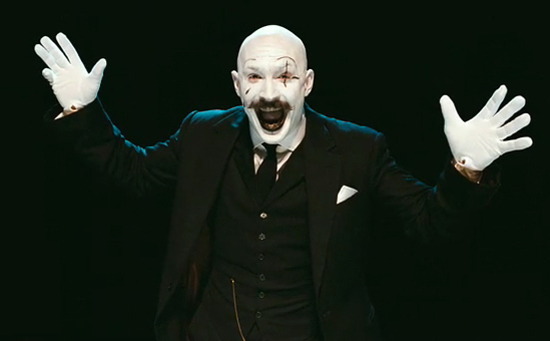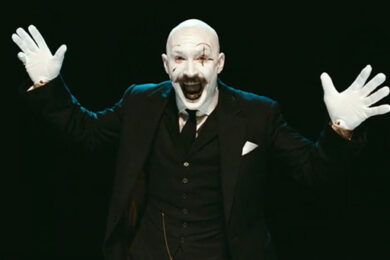Last week’s news that the UK Film Council had been axed by the new Coalition Government had a few industry figures, journalists and online agitator’s reaching for the panic button, or the mouse, or the limp caress of a mouse pad. Mike Leigh was ‘reeling’ from shock – how apt; Facebook recorded around 25,000 ‘Just Say No’s…’ – not bad, but not quite as many as the alternative woodsman/ folk- hero (Raul Moat) who, only weeks previously, clocked up a disturbingly impressive 35,000.
The UK Film Council worked like any other (English) corporate magnet: from the greedy bowels of London. In truth, it should really have been called the London Film Council. Save for the odd clichéd picture of slum living in Glasgow (Red Road), or unsubtle, one-sided Irish politics (Hunger / The Wind That Shakes the Barley), it had no idea of life outside of The Capital; no gamble on other view-points, or visions.
It was for those who know how to fill out forms – whose heart was in The City among people with corporate bullet-points for eyes. I heard them all the time, speaking the language of the 90s office, the same language dovetailed into the world of the creator with phrases like ‘networking’ and ‘maximum return’. Media-speak: give them what they want. Reveal everything. Somehow they’d managed to find something even more embarrassing than the ‘two-minute, and no more’ Hollywood pitch: this was the ‘two weeks and your whole soul’ deal.
It looked no further than profit, and stifled anything that they didn’t know first-hand. It wedded itself to the middle-class ‘feel-good’ (awful expression) London of Four Weddings and a Funeral, or the insipid cross-cultural ‘feel-good’ cultural imperialism of Slumdog Millionaire, and like the kid who finally concedes to the beatings, revelled in the dubious, middle-class glamorisation of backwards masculinity as seen in Bronson. This wasn’t the UK. This wasn’t mine and a million others story of the UK. This was misrepresentation – to use one of New Labour’s, and another one of modern Britain’s dreadfully inexact office words.
Places like Liverpool may as well have died with Lennon; and Leeds with the Ripper; and Manchester with that Faustian handshake between a bloated Noel and a beaming Blair. Progress was duly put on the back burner – to retain the status quo, to remain closer to our ‘providers’ (New Labour), and never to question their authority in art, or music, or film, or on the page. The Film Council upheld this and forced film-makers into questioning the market value of their ‘product’. It favoured bankable (the salient word of the last decade) figures – Mike Leigh, Sam Taylor Wood et al – over the always-brilliant, but unusually aloof, Chris Morris – whose masterly Four Lions is a lesson in modern film-making – and stuck close to the corporate New Labour mantra, ‘How Does This Product Best Represent Us?’ And now the stranglehold has strangled the providers, we’re left with the inevitable nothing and very little to show for all that dough and power.
That’s not to say that the UK Film Council backed dud after dud or that their co-productions were worthless, but the exceptions are scarce: In The Loop and Fishtank to name two recent home-grown successes. This is the inevitable climax of commercial capitalism. Its mainstay is to play it safe, but not to look too conservative. This was the perfect climate and playground for New Labour. Since when did film-makers sit in meetings, or chair public events with politicians? This was never the point, surely. All those days and nights marvelling at the work of Kubrick, Peckinpah, Casavettes, Scorsese, Lynch and even Alan Clarke himself, and it all comes down to this: another overly-detailed form and a man in a flapping suit, selling a limp, and incorrect picture of Britain to their untrustworthy acolytes in the global market. Let’s not mince words: the UK Film Council is a victim of its own mediocrity. What was, and is, obviously a good idea lived out its days in thrall to the might of economic London, our moneyed core. These questionable values are the story of the last decade. We’re talking the revenge of failed writers, artists and musicians (Blair included) here, spending frivolously as they morph into one another and become one person; one mantra; one business; one world. It’s a story waiting to be filmed, on the cheap in digital with no outside interference.
Simple fact is that the past decade is the age of deluded applause. A large majority of good things that happened in that decade have yet to be reviewed, or seen, or discovered, or applauded. I’m certain of it. It’s all there in the non-figure: the big ‘O’; the nought that swallowed our passion. It’s written in the bloodlines of New Labour – and with the insidious and misleading use of that word ‘New’ in particular; written in the duplicitous faces of those two mean-spirited media oligarchs Simon Cowell and Charles Saatchi; written in the rise of celebrity chefs, celebrity TV, the England football team. The lines have been drawn so cynically and so murkily that if it’s not rooted in celebrity, if it’s not ‘business’ as we know it nowadays then think again: we’re not bothered. Your reality is of no worth to us.
Instead they became the system, and more forms were knocked back on the grounds of somebody’s (phantom) taste. And now, its days are dust, and all the fashionable Facebook-frenzy in the world will do well to have it any other way. It’s obviously never a good thing when people get the sack, but I hope filmmakers and artists and writers and musicians see this is an opportunity to strike; to realise that governments have been lagging behind the thinking public for some time now, ever since the tabloids did their job and exposed them as flawed everymen. And though the Newly Unelected will inevitably continue the national annihilation and cultural genocide that began in 1979, this time we won’t be licking up to them, or their tricky forms; because this time we’ll be asking the questions.
Austin Collings is currently writing a novel set in 90s England. He will be downing tools very soon as Brollywood Productions starts filming ‘Nocturnes’ in the next few months, having secured a micro-budget that may well be enough to see them through – although any outside donations are always welcome. The screenplay of Nocturnes _has received a fair bit of praise: the director Julian Jarrold (1974, Red Riding), likened it to the work of Alan Clarke (_Scum, Made in Britain, The Firm et al) and Samuel Beckett; one script editor saw it as a ‘fiercely contemporary comment’ on modern Britain; the Executive Producer of BBC Films described it as ‘distinctive and atmospheric’.



